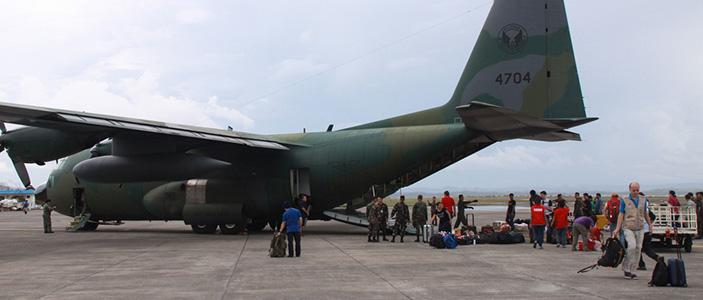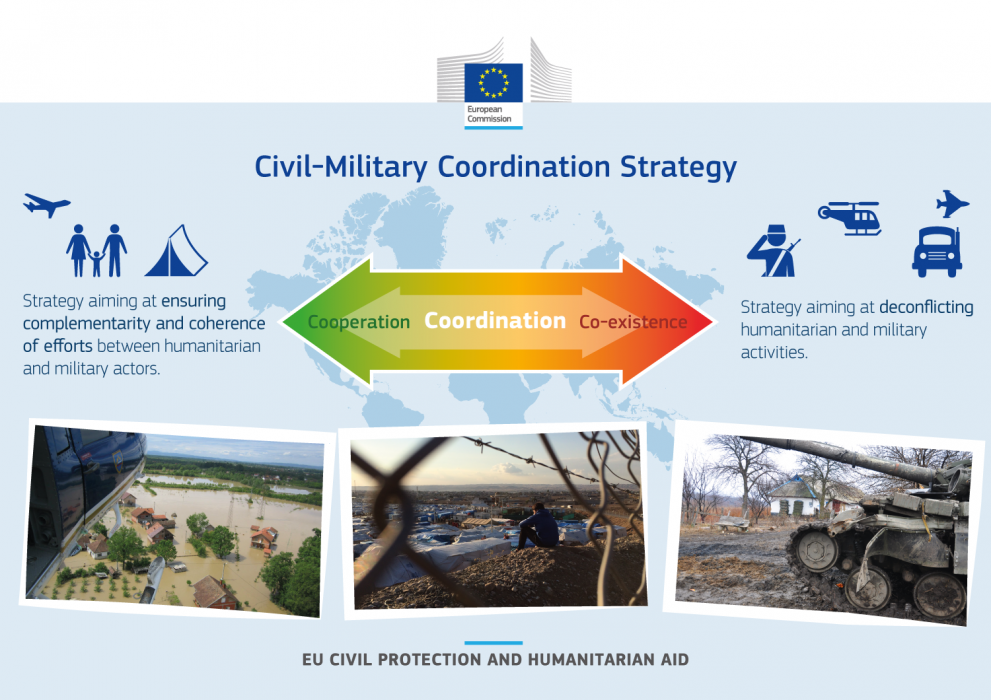
The European Union promotes the coordination between civilian and military actors in emergencies. Humanitarian Civil-Military Coordination (CMCoord) is necessary to protect and promote humanitarian principles, avoid competition between civilian and military capacities, minimise inconsistency, and when appropriate, pursue common goals.
The changing nature of modern conflicts, natural hazards and crises make dialogue and interaction between civil protection and humanitarian responders and the military ever more relevant. Civil-military coordination is crucial in supporting humanitarian assistance and disaster relief. The scope and form of the civ-mil interaction always depends on the specific context of the crisis. A case-by-case evaluation is necessary to safeguard the humanitarian space and the perception of aid as independent and neutral.
Coordination strategies range from:
• Co-existence: focusing on de-confliction and on minimising inconsistency, which is typical of conflict settings with military actors involved in active combat
• Cooperation: focusing on harmonising a combined effort, could be adopted in natural disasters, as appropriate.
CMCoord is essential to maintain a clear distinction between civil and humanitarian responders on one side, and the military on the other. Humanitarian aid assistance needs to be delivered according to the humanitarian principles and there should be no duplication of efforts.
Certain humanitarian emergency and disaster situations require capabilities available only from the military community. Such services include strategic air and sealift, medical support and medical evacuation capacities, specialised engineering capabilities, etc. Humanitarian and civil protection responders may request support from the military, as a last resort, when no civilian or commercial option is available, in accordance with internationally agreed civ-mil guidelines (i.e. Oslo and MCDA) and recommended practices. Exceptionally, assistance by the military might also be required in order to create appropriate safety conditions for humanitarian workers to deliver aid and operate in complex emergencies.

How are we helping?
The European Commission works closely with the European External Action Service’s crisis management structures, especially the EU Military Staff, as part of the EU Integrated Approach to external conflict and crises. It covers the:
- Mobilisation of military assets in support of EU humanitarian assistance and disaster relief.
- Inclusion of humanitarian considerations into the planning and conduct of EU Common Security and Defence Policy (CSDP) missions and operations.
- Collaboration on EU security and defence initiatives, as well as training, exercises and education.
To raise awareness towards humanitarian principles and humanitarian civil-military coordination, the European Commission organises presentations to EU personnel deployed in CSDP missions and operations in European Security and Defence College’s (ESDC) trainings and to military academies in Member States.
The EU Concept on Effective Civil-Military Coordination in Support of Humanitarian Assistance and Disaster Relief, approved by the EU Military Committee in 2019, collects lessons learnt and best practices from years of mutually beneficial engagement between the EU Military Staff and the European Commission, and provides direct operational guidance to EU Mission and Operation Commanders. It also operationalises in the EU the UN Recommended Practices for Effective Humanitarian Civil-Military Coordination of Foreign Military Assets in Natural and Man-Made Disasters.
The European Union strongly supports the United Nations role on humanitarian civil-military coordination, including through global advocacy and funding for dedicated UN OCHA staff in charge of ensuring the appropriate level of coordination between humanitarians and the military on the ground.
Assistance to the coronavirus
In the context of coronavirus epidemic, military planes were used for the repatriation of EU citizens, as part of a wider EU repatriation effort. Also, personal protective equipment, i.e. masks, were partly transferred by military planes via the EU Civil Protection Mechanism.
Assistance to Caribbean islands in response to hurricanes
Dutch Navy vessels and military personnel delivered assistance to the Caribbean islands after hurricanes destroyed livelihoods and essential infrastructure. Substantial military assistance was provided via the EU Civil Protection Mechanism after hurricane Matthew struck Haiti in 2016, hurricane Maria destroyed large parts of Dominica in 2017, and Dorian caused damage on the Bahamas in 2019.
Ebola response in Liberia, Sierra Leone and Guinea in 2014
As part of a coordinated European response, a Dutch vessel carried vital supplies to the three worst-hit countries by the Ebola virus in West Africa: Liberia, Sierra Leone and Guinea. The ship transported 160 vehicles, 80 containers and about 1 200 tons of vital supplies and medical equipment. In addition, military medical evacuation planes by the United Kingdom were mobilised via the EU Civil Protection Mechanism.
Related links
- EU Council Conclusions on the Integrated Approach to External Conflicts and Crises
- EU Concept on Effective Civil-Military Coordination in Support of Humanitarian Assistance and Disaster Relief
- EU Concept on Protection of Civilians in EU-led Military Operations
- Meeting of the Humanitarian Liaison Working Group (HLWG) focusing on "effective humanitarian civil-military coordination"
- DG ECHO-EU Military Staff article on the EU civ-mil concept in the EUMS Impetus Magazine (issue 28)
- DG ECHO’s partnership with the European Security & Defence College
- UN Recommended Practices for Effective Humanitarian Civil-Military Coordination of Foreign Military Assets (FMA) in Natural and
- UN Guidelines on the use of Military and Civil Defence Assets (MCDA) to support United Nations Humanitarian Activities in Complete
- Oslo Guidelines on The Use of Foreign Military and Civil Defence Assets In Disaster Relief
- IASC Non-Binding Guidelines on the "Use of Military or Armed Escorts for Humanitarian Convoys
- OCHA Civil-Military Coordination Service’s Humanitarian-Military Dialogue
- CMCoord Operational Guidance on COVID-19
